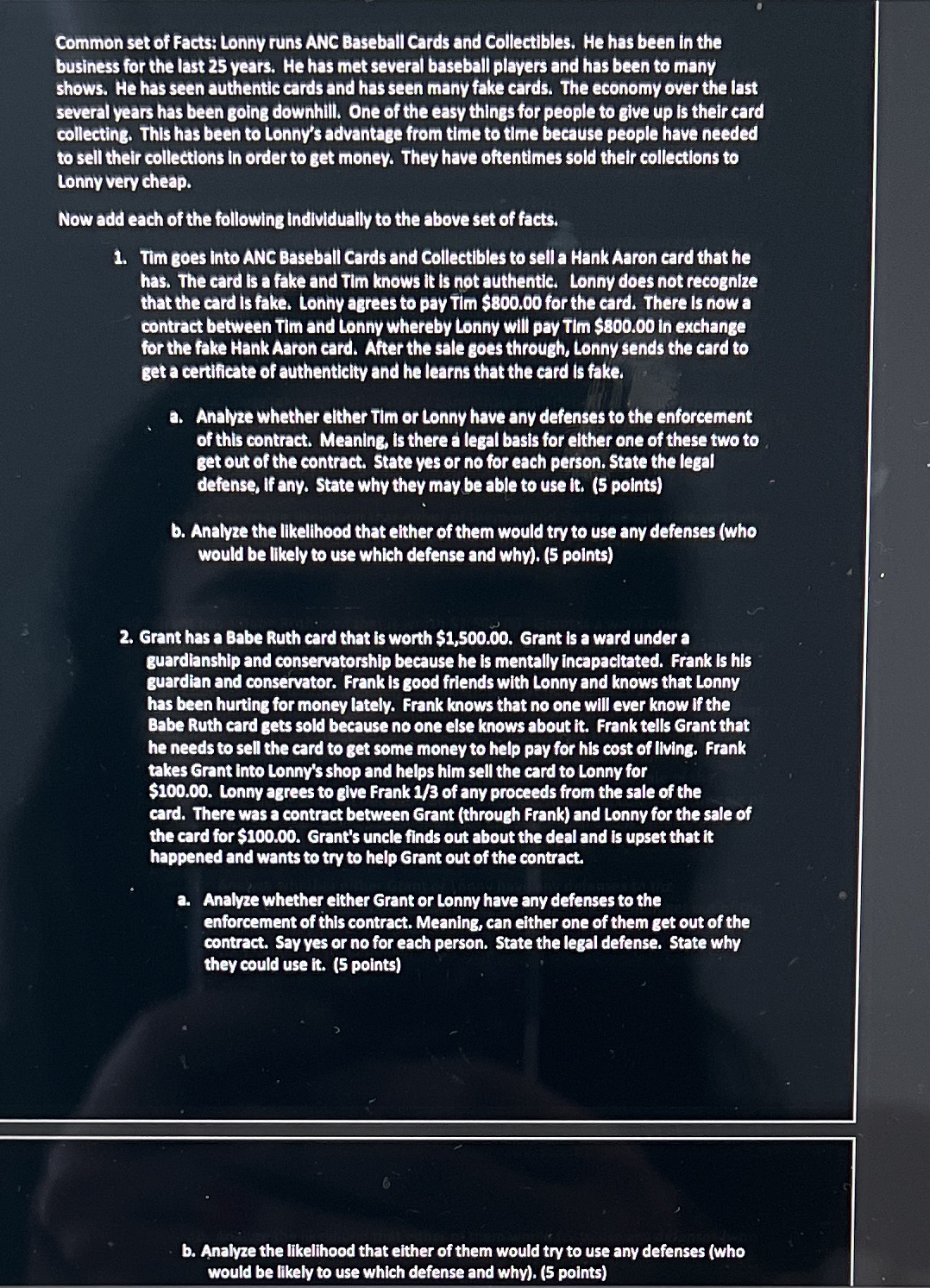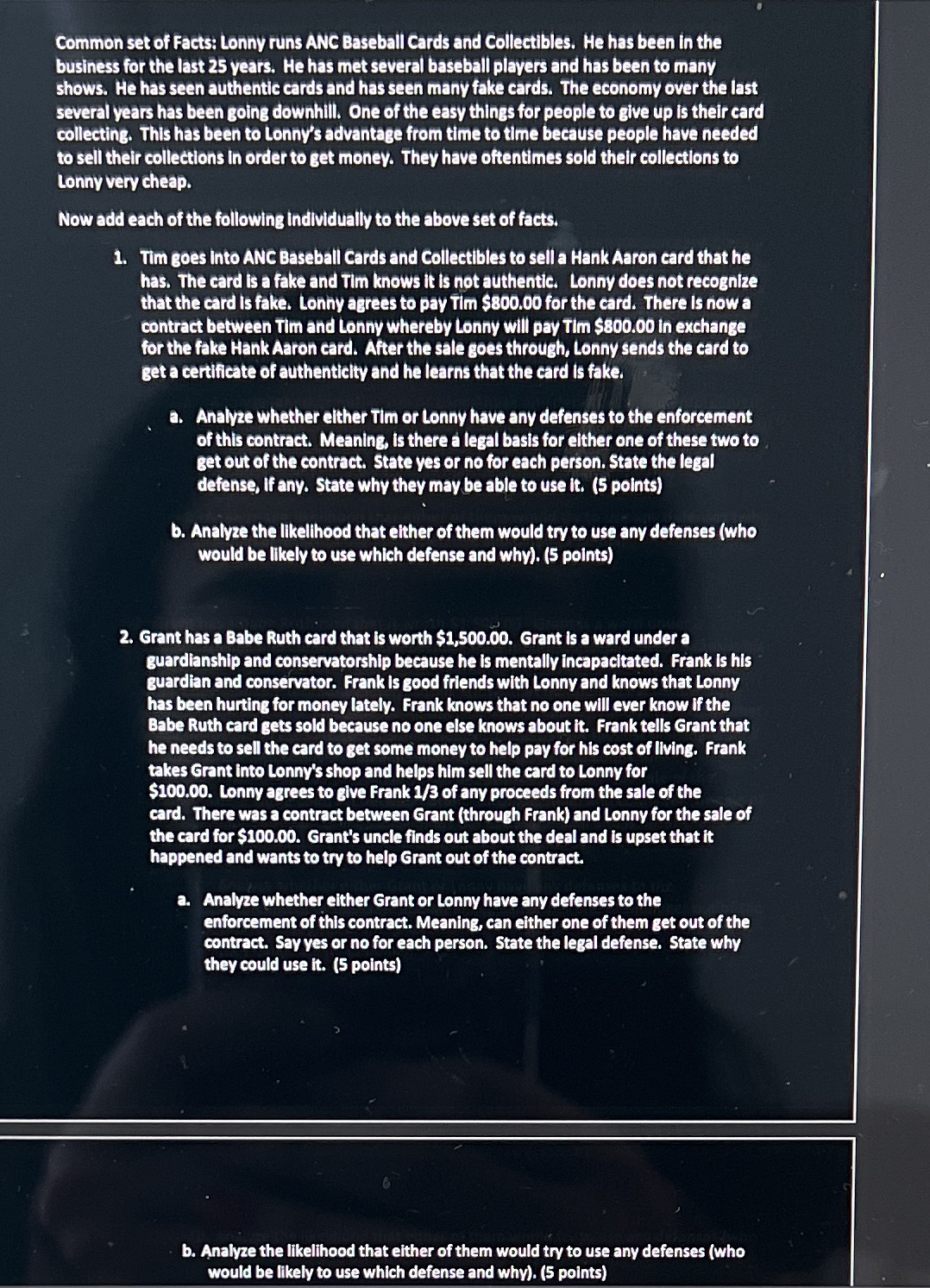Question
Read this paragraph please before answers Defenses to Contract Enforceability AVWhat does that title mean? What it means is that sometimes, even if you have

Read this paragraph please before answers Defenses to Contract Enforceability AVWhat does that title mean? What it means is that sometimes, even if you have formed a valid contract with someone, you will be unable to enforce it in a court of law for some reason. There are some contracts that require a certain form. Some contracts must be in writing. Some contracts have conditions. Sometimes, a party could get out of a contract for a certain reason.While mistake of the law is not a valid reason to get out of a contract, a mistake of FACT may be a reason to get one of the parties out of the contract. If both parties to a contract are mistaken about a material fact to the contract, they both have the ability to get out of the contract (rescind). As a general rule if only one party is mistaken as to a material fact, they cannot rescind the contract. The exceptions to this are if the other party knew or should have known that there was an error or if there was a mathematical mistake.Sometimes you can be misled into entering into a contract. If one of the parties commits fraudulent misrepresentation, the OTHER party can get out of performing the contract. In order to get out of performance under fraudulent misrepresentation, you must be able to show all three of these elements: 1) misrepresentation of a MATERIAL fact, 2) Intent to deceive, 3) The innocent party relied on the misrepresentation. An example would be if a car dealer sells you a car that he knows has had the odometer turned back from 130,000 miles to only 80,000 miles. When you go in to look at the car, the dealer tells you that the car only has 80,000 miles (the misrepresentation of a material fact). It can be inferred that he is telling you this because he wants you to believe it and wants you to purchase the car at a higher price. You purchase the car based on this representation because you believe the car dealer. You are justified in believing the car dealer because he is in the business of selling cars and you should be able to rely on his statements. If the car dealer had represented to you that the car had been owned only one time by a guy named Fred but the previous owner's name was George, that most likely is not a material fact and would not be enough to get you out of the contract. The misrepresentation must be of a material fact and just as is the case in all of contract cases, the court will look at what a reasonable person would think in interpreting the contract.Another way that a person might be able to get out of a contract is if you were forced to enter the contract by way of undue influence. This comes into play when there is a special relationship with another person and that person uses the special relationship to get the party to enter into the contract. Some examples are doctor, patient; attorney, client; guardian, ward. These are generally relationships where one person has more power or control or has special trust and uses that to get the other party to enter into a contract they do not really want to enter into.Just as is the case in criminal law, it is possible to force someone into a contract. This is where the person feels forced by way of a threat of illegal action. If this is the case, the person who was forced into the contract by way of duress can get out of it.Some contracts must be in writing in order to be enforceable. These contracts include, sale of real estate, contracts in consideration of marriage, contracts that CANNOT (by their own terms) be completed within a year, collateral contracts and contracts for the sale of goods over $500. In each of these cases, if the contract is not in written form, it will not be upheld in a court of law. This is because of The Statute of Frauds, a rule that was enacted to prevent fraud that was occurring with oral contracts.When dealing with a contract that falls under the statute of frauds, there are some exceptions where a contract will be upheld in court. If a party admits under oath that there was a contract, the court can enforce it (why? because it eliminates the risk of fraud if the party admitted to the contract). Another example would be if you ordered specially manufactured goods that cost in excess of $500.00...for example, if I order $700 worth of tshirts that say Moon's Business Law Students Rock...the court may very well enforce that without a writing because the chance of fraud with that contract is slim. Why else would the tshirt manufacturer spend all the time and effort making shirts that said that unless they really were ordered. Also, if there is no writing, but part of the goods have been delivered, the court will enforce the contract to the extent that goods have been accepted.If you do have a written contract, keep in mind that the written contract is the entirety of the contract. It is not possible to admit additional evidence at the trial to say what you may have intended. You are not allowed to introduce evidence that is in conflict with what the contract says. This is because of the Parol Evidence Rule. As you enter into the world of business, it is important to remember this rule and to include as many details in your contract as you can. There are several exceptions to the parol evidence rule. There are always exceptions in the law...something that is frustrating to a lot of people (attorneys, judges and parties).

Step by Step Solution
There are 3 Steps involved in it
Step: 1

Get Instant Access to Expert-Tailored Solutions
See step-by-step solutions with expert insights and AI powered tools for academic success
Step: 2

Step: 3

Ace Your Homework with AI
Get the answers you need in no time with our AI-driven, step-by-step assistance
Get Started


